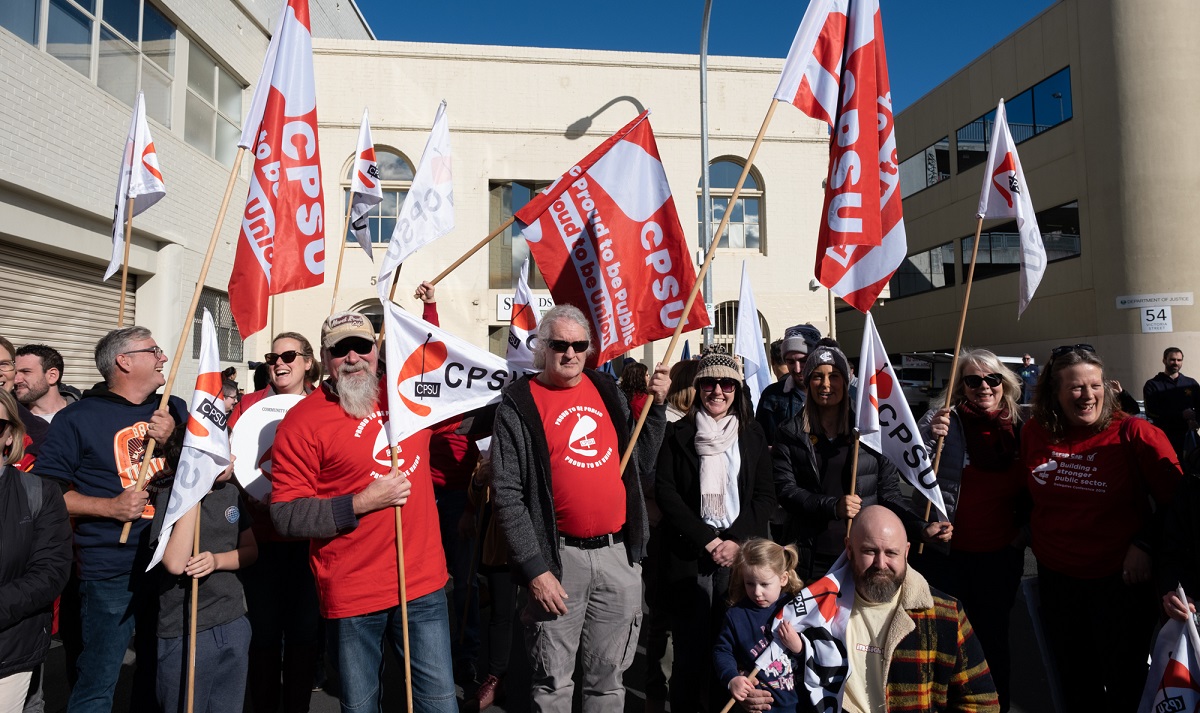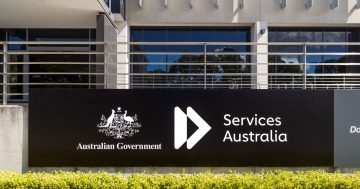
Unions and the government appear to be at an impasse in their negotiations. Photo: CPSU.
Despite an escalation of industrial action in the last week by the Community and Public Sector Union (CPSU), the ball appears to still be in the union’s court about when or if talks with the Australian Public Service Commission (APSC) will resume.
Talks are at a stalemate after the two sides failed to make any progress late last month beyond the Commonwealth’s current offer of an 11.2 per cent wage increase over three years.
Thursday, 28 September, was the date set aside to finalise details of the package the Commonwealth is offering APS employees for the next enterprise agreement. While the Australian Public Service Commission’s (APSC) chief negotiator, Peter Riordan, had thought the government was close with additional benefits and provisions on offer, he was less certain about the pay offer. And he was right.
The offer was an increase of 0.7 per cent over the previous mark of 10.5 per cent, which was rejected in May. Despite the CPSU putting the 11.2 per cent offer to an informal vote of its 50,000 members and 51.9 per cent voting to accept it, the union said the majority was not clear enough to recommend it be accepted.
This is still far short of the union’s original claim for a 20 per cent increase, a figure Public Service Minister Katy Gallagher previously described as “impossible to deliver”.
“But we do want reasonable, affordable pay rises,” Senator Gallagher said in March.
“They are doing what they need to do on behalf of their members. I understand that. We’ve got a job to do, too, which is to make sure the budget is sustainable.
“We are coming from different standpoints. Hopefully, we can meet in the middle.”
That ‘middle’ appears to be a chasm at the moment, and negotiations are at an impasse.
Following the breakdown of negotiations, the CPSU applied for a series of protected actions by its members in the Fair Work Commission.
The first action was an ‘auxiliary code ban’ where staff in Services Australia wouldn’t enter prescribed codes to allow management to track the tasks individual employees perform at any given time. This later escalated to a string of one-hour stop-work meetings, culminating in Monday’s (9 October) 24-hour strike at Services Australia.
The impact of the strike on the public appears to have been minimal, and it was estimated that less than 3000 of the agency’s 28,000 staff were absent from work.
Services Australia general manager Hank Jongen suggested last week that anyone with business at Medicare or Centrelink should try to delay their visit until Tuesday or after.
“Payments will not be affected,” Mr Jongen said.
“Anyone expecting payments on Monday or Tuesday will receive them as usual, and those who need to report their income will be able to do so.”
Media reporting on Monday night indicated clients had experienced normal wait times.
So, what’s next?
In response to questions from Region, an APSC spokesman said, “The Commonwealth is committed to the current package of pay and conditions which have been negotiated in good faith”.
“This includes the headline pay offer, which represents the largest pay offer to APS employees in over a decade.”
CPSU National Secretary Melissa Donnelly said last week that the only way forward is for the government to “revisit” its pay offer.
But the government said it’s unlikely to make the first move.
“The Chief Negotiator remains available for negotiations with unions and employee bargaining representatives if they wish to reconsider the offer,” the APSC told us.
Meanwhile, the union announced last week that it was lodging applications for further protected action ballots in other agencies, with the Fair Work Ombudsman, the Department of Agriculture, Fisheries and Forestry, and the Department of Employment and Workplace Relations now on its hit list.
Over at the Australian Taxation Office (ATO), an internal staff survey reportedly showed that just one-third of the staff who responded think the government’s offer is acceptable.
But the fact that barely one-third of the ATO’s nearly 21,000 staff responded to the survey might be telling, suggesting a higher level of indifference than the 9 per cent of respondents who said they were unsure how they felt.
The government had hoped to have the pay deal squared away soon so it can meet the March 2024 schedule to increase wages.
“We remain hopeful that we can reach agreement as soon as possible to ensure APS employees can receive their pay increase on the proposed common pay date in March 2024,” the APSC said.
The APSC added that there is no plan to shift the negotiation process away from the current APS-wide bargaining to an agency-by-agency basis.
“The government remains committed to APS-wide bargaining, which it sees as an important measure to ensure the APS is a model employer that offers a strong Employee Value Proposition,” it said.




















